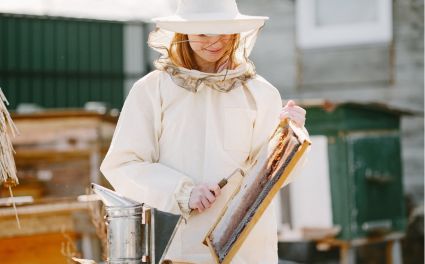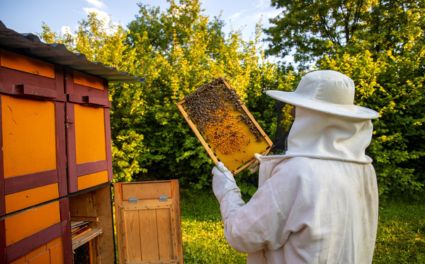Bienenhaltung ist Kunst und Wissenschaft zugleich und erfordert Wissen, Geduld und die richtige Ausrüstung. Eine der wichtigsten Voraussetzungen für eine erfolgreiche Bienenhaltung ist das Verständnis und die Nutzung eines Bienenstocks. In diesem Blogbeitrag gehen wir näher darauf ein, was ein Bienenableger ist, welche Bedeutung es hat und welche entscheidende Rolle es in der Bienenhaltung spielt. Egal, ob Sie Anfänger oder erfahrener Imker sind, dieser Leitfaden bietet Ihnen wertvolle Einblicke in die Welt der Kernbeuten.
Einen Bienenkern verstehen
Ein Nuc of Bees (kurz für Nucleus Hive) ist ein kleines, überschaubares Bienenvolk, das aus einem größeren Volk hervorgeht. Es enthält typischerweise eine Bienenkönigin, einige tausend Arbeiterbienen, Brut (Eier, Larven und Puppen) und einen Honigvorrat. Der Nucleus Hive befindet sich in einem kleineren Kasten mit meist drei bis fünf Rähmchen und ist dadurch leichter zu handhaben und zu transportieren als ein normaler Bienenstock. Das Verständnis des Konzepts eines Nuc of Bees ist grundlegend für das Verständnis der Grundlagen der Bienenhaltung.
Bedeutung eines Kernstocks in den Grundlagen der Bienenhaltung
Ein Ablegerstock dient als Grundbaustein der Bienenhaltung. Er ermöglicht Imkern den Start mit einem kleineren, besser kontrollierbaren Volk, das mit der Zeit zu einem vollwertigen Volk heranwachsen kann. Für Anfänger vereinfacht die Arbeit mit einem Ablegerstock den Lernprozess und erleichtert das Verständnis des Bienenverhaltens, der Stockdynamik und der grundlegenden Imkereitechniken.

Komponenten eines Bienenabstamms
Ein Bienenstock besteht aus mehreren wichtigen Komponenten, die jeweils eine entscheidende Rolle für die Gesundheit und Entwicklung des Bienenvolks spielen:
-
Bienenkönigin: Die Bienenkönigin ist das Herz des Bienenstocks. Sie legt Eier und sorgt für den Bestand. Eine gesunde, produktive Königin ist entscheidend für den Erfolg des Bienenstocks.
-
Arbeiterbienen: Diese Bienen sind das Rückgrat des Bienenvolks und erfüllen verschiedene Aufgaben wie die Suche nach Nektar und Pollen, die Fütterung der Brut, die Reinigung des Bienenstocks und den Schutz vor Bedrohungen.
-
Brut: Die Brut umfasst Eier, Larven und Puppen und stellt die zukünftige Bienengeneration dar. Ein Ableger mit einem gesunden Brutmuster weist auf ein blühendes Bienenvolk hin.
-
Honiggeschäfte: Honigvorräte sind für das Überleben des Bienenvolks unerlässlich und bieten den Bienen Nahrung, insbesondere in Zeiten, in denen keine Nahrungssuche möglich ist.
Die Rolle der Bienenkönigin in einem Kernstock
Die Rolle der Bienenkönigin in einem Kernstock ist von größter Bedeutung. Ihre Fähigkeit, regelmäßig Eier zu legen, sichert das Wachstum und den Fortbestand des Volkes. Eine gut begattete Königin legt befruchtete Eier, aus denen sich Arbeiterinnen entwickeln und so die Arbeitskraft des Stocks erhalten. Die Anwesenheit einer starken Königin stabilisiert zudem das Volk und verringert die Wahrscheinlichkeit von Schwärmen oder anderen störenden Verhaltensweisen.
Vorteile der Verwendung eines Bienenkerns
Vorteile der Anschaffung eines Ablegerstocks für neue Imker
Für neue Imker bietet der Start mit einem Bienenableger mehrere Vorteile:
-
Handliche Größe: Eine kleinere Kolonie ist einfacher zu handhaben und für Anfänger weniger einschüchternd, was sie zu einer hervorragenden Möglichkeit macht, Selbstvertrauen und Fähigkeiten aufzubauen.
-
Schnelles Wachstum: Ablegerbeuten sind so konzipiert, dass sie schnell zu vollwertigen Kolonien heranwachsen und so den Imkern eine schnellere Kapitalrendite ermöglichen.
-
Gesündere Bienen: Bienen in einem Ableger sind oft gesünder und weniger gestresst als Bienen in Paketbienen, da sie bereits mit einer funktionierenden Königin und Brut ausgestattet sind.
Wie ein Nuc zur Bienengesundheit und Kolonieausbreitung beiträgt
Ablegerbeuten tragen erheblich zur allgemeinen Bienengesundheit und zum Wachstum der Kolonie bei.Durch die Verwendung eines gesunden Ablegers können Imker das Risiko von Krankheiten und Parasitenbefall verringern. Darüber hinaus bietet ein Ableger eine kontrollierte Umgebung für die Aufzucht neuer Königinnen, die zur Stärkung anderer Bienenstöcke oder zur Schaffung neuer Bienenstöcke genutzt werden können und so die Kolonieausweitung erleichtern.
Einrichten und Verwalten eines Bienenkerns
Unverzichtbare Imkereiausrüstung für die Einrichtung eines Nuc
Für die Einrichtung eines Bienenstocks sind einige grundlegende Imkereigeräte erforderlich:
-
Nuc-Box: Eine stabile Kiste mit 3 bis 5 Rahmen zur Unterbringung der Kernkolonie.
-
Rahmen: Rahmen mit Mittelwänden oder gezogenen Waben, auf denen die Bienen bauen können.
-
Schutzausrüstung: Imkeranzüge, Handschuhe und Schleier zum Schutz vor Stichen.
-
Stockmeißel: Ein vielseitiges Werkzeug zum Auseinanderhebeln von Rahmen und Abkratzen von überschüssigem Propolis.
-
Raucher: Zur Beruhigung der Bienen bei Inspektionen und Manipulationen.
Imkereitechniken für die erfolgreiche Bewirtschaftung eines Kernstocks
Für die erfolgreiche Verwaltung eines Kernstocks sind mehrere Schlüsseltechniken erforderlich:
-
Regelmäßige Inspektionen: Führen Sie regelmäßige Bienenstockinspektionen durch, um die Gesundheit der Königin, das Brutmuster und den Gesamtzustand der Kolonie zu überwachen.
-
Fütterung: Bei Mangel an natürlichem Futter kann eine Zusatzfütterung mit Zuckersirup oder Pollenpastetchen erfolgen.
-
Krankheitsmanagement: Achten Sie auf Anzeichen von Krankheiten oder Schädlingen, wie beispielsweise Varroamilben, und ergreifen Sie geeignete Maßnahmen, um etwaige Probleme zu beheben.
-
Erweiterung: Wenn die Kolonie wächst, bereiten Sie sich darauf vor, die Bienen in einen größeren Stock zu verlegen, um ihrer zunehmenden Population gerecht zu werden.
Die Rolle eines Bienenabsatzes in der Bienenhaltung
Wie ein Bienenabsatz die Bienenstockverwaltung unterstützt
Ein Bienenableger ist ein unschätzbares Werkzeug in der Bienenstockverwaltung. Er ermöglicht Imkern:
-
Schwache Bienenstöcke neu bevölkern: Verwenden Sie Ablegervölker, um schwache oder schwindende Kolonien zu stärken und so die Nachhaltigkeit des Bienenstocks zu gewährleisten.
-
Königinnenzucht: Ableger bieten eine ideale Umgebung für die Aufzucht neuer Königinnen, die als Ersatz für alte oder schwächelnde Königinnen in anderen Bienenstöcken verwendet werden können.
-
Bienenstöcke teilen: Teilen Sie starke Kolonien einfach in Ableger auf, um Schwärmen vorzubeugen und die Population der Bienenstöcke zu kontrollieren.
Die Bedeutung von Ablegern für die Erhaltung und Erweiterung eines gesunden Bienenvolkes
Ablegerbeuten sind für die Erhaltung und den Ausbau gesunder Bienenvölker unerlässlich. Durch die Bereitstellung einer kontrollierten Umgebung für die Bienenentwicklung tragen Ablegerbeuten zur Kontinuität und Vitalität der Bienenpopulationen bei. Sie bieten zudem Flexibilität im Bienenstockmanagement und ermöglichen es Imkern, auf verschiedene Herausforderungen und Chancen im Bienenstand zu reagieren.
Gemeinsame Herausforderungen und Lösungen
Mögliche Probleme bei der Arbeit mit einem Bienenabstamm
Bei der Arbeit mit einem Bienenabsatz können Imker auf verschiedene Herausforderungen stoßen:
-
Königin-Versagen: Wenn die Bienenkönigin keine Eier legt oder stirbt, kann das Wachstum des Bienenvolks beeinträchtigt werden.
-
Schädlingsbefall: Ablegervölker können anfällig für Schädlinge wie die Varroamilben sein, die das Volk schwächen können.
-
Wetterbedingungen: Extreme Wetterbedingungen können die Gedeihfähigkeit des Ablegers beeinträchtigen, insbesondere wenn die Bienen nicht effektiv Nahrung suchen können.
Tipps zur Bewältigung häufiger Herausforderungen in der Bienenhaltung
Um diese Herausforderungen zu meistern, können Imker die folgenden Strategien anwenden:
-
Regelmäßige Überwachung: Behalten Sie die Leistung der Königin und den allgemeinen Gesundheitszustand des Volkes genau im Auge. Ersetzen Sie die Königin bei Bedarf.
-
Schädlingsbekämpfung: Implementieren Sie integrierte Schädlingsbekämpfungstechniken zur Bekämpfung der Varroamilben und anderer Schädlinge.
-
Wetterschutz: Sorgen Sie für zusätzlichen Schutz, beispielsweise durch Bienenstockumhüllungen oder Windschutz, um den Kern vor rauen Wetterbedingungen zu schützen.

Verbessern Sie Ihre Bienenhaltungserfahrung mit OZ Armour
Neben dem Verständnis der Feinheiten der Bienenhaltung ist es wichtig, die richtige Schutzausrüstung zu haben. OZ Armour bietet eine Premium-Kollektion von Imkeranzüge Und Imkerhandschuhe Entwickelt für maximalen Schutz und Komfort. Unsere Anzüge sind aus strapazierfähigen, atmungsaktiven Materialien gefertigt, damit Sie bei der Bienenstockpflege kühl und sicher bleiben. Zusammen mit unseren hochwertigen Handschuhen, die hervorragende Fingerfertigkeit und Schutz bieten, können Sie Ihre Bienen sicher betreuen und Bienenstockinspektionen durchführen. Rüsten Sie sich mit OZ Armour-Ausrüstung für ein sichereres und angenehmeres Imkererlebnis aus.
Abschluss
Das Verständnis und die Nutzung von Ablegern sind für eine erfolgreiche Imkerei unerlässlich. Diese kleinen, überschaubaren Völker bilden die Grundlage für Lernen, Wachstum und effektives Bienenstockmanagement. Ob Sie schwache Völker wiederbevölkern, neue Königinnen aufziehen oder Ihren Bienenstand erweitern möchten – Ableger bieten unschätzbare Vorteile. Durch die Bewältigung gängiger Herausforderungen und die Anwendung bewährter Verfahren können Imker die Gesundheit und Produktivität ihrer Völker sicherstellen. Darüber hinaus ist die richtige Schutzausrüstung, wie z. B. OZ-RüstungDie Imkeranzüge und -handschuhe von verbessern Ihr Imkererlebnis und bieten Sicherheit und Komfort. Nutzen Sie die Kraft eines Bienenstamms für einen erfolgreichen und nachhaltigen Imkereibetrieb.












